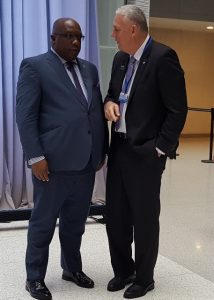Basseterre, St. Kitts, October 11, 2016 (SKNIS)—Debt reduction, loss and/or increased cost of correspondent banking services, mobilization of diaspora flows/remittances, and a call for the International Monetary Fund (IMF) and the World Bank to develop stronger partnerships with Caribbean member states were among issues addressed by Prime Minister of St. Kitts and Nevis and Minister of Finance, Dr. the Honourable Timothy Harris, at the recently concluded Governors’ Meeting with World Bank Senior Vice President of Operations, Kyle Peters, held on Saturday October 8, 2016.
The meeting with the World Bank in Washington D.C. came on the heels of the 2016 Commonwealth Finance Ministers Meeting (CFMM) held at the Headquarters of the International Monetary Fund (IMF) in Washington D.C. on October 6.

In his introduction at the Governors’ meeting, Prime Minister Harris, who was designated lead Caribbean speaker, focused on the main imperatives for the Caribbean, while he made special reference to the significant progress that St. Kitts and Nevis has made by reducing its record high debt-to-GDP ratio. He cited the IMF’s August 3, 2016 report which stated that: “….The Federation’s economy is in a good state of health and that the debt-to-GDP ratio is on a downwards trajectory which will see it plummet to the Eastern Caribbean Currency Union’s (ECCU) 60 percent target in 2017, well ahead of other member states….” Dr. Harris noted that this ratio has declined from 159 percent in 2010 and is projected to reach its 60 percent target in 2017.
While drawing attention to the significance of this remarkable achievement, Dr. Harris outlined some of what this means for St. Kitts and Nevis. He said that this lower debt load reduces the huge expenditures that St. Kitts and Nevis was incurring on the interest costs of financing the outstanding public debt. According to the prime minister, these savings are now made available for meeting basic human needs.
Additionally, the prime minister highlighted the difficult challenges that the region faces because of the termination and/or increased cost of correspondent banking services offered by the large commercial banks. These higher costs, he said, adversely affect the flow of personal remittances from abroad which are critically important to our development. He called on the IMF and World Bank to develop stronger partnerships with the Caribbean member states in addressing this and other major challenges that the Caribbean faces.
Prime Minister Harris’ introductory address was followed by presentations on “Correspondent Banking” by Dr. the Honourable Carla Barnett, Minister of State for Belize; “Energy” by the Honourable Allen Chastanet, Prime Minister and Minister of Finance for St. Lucia; “Fiscal and Debt Sustainability” by the Honourable Audley Shaw, Minister of Finance for Jamaica; and “Climate Change” by the Honourable Camillo Gonsalves, Minister of Foreign Affairs for St. Vincent and the Grenadines.
